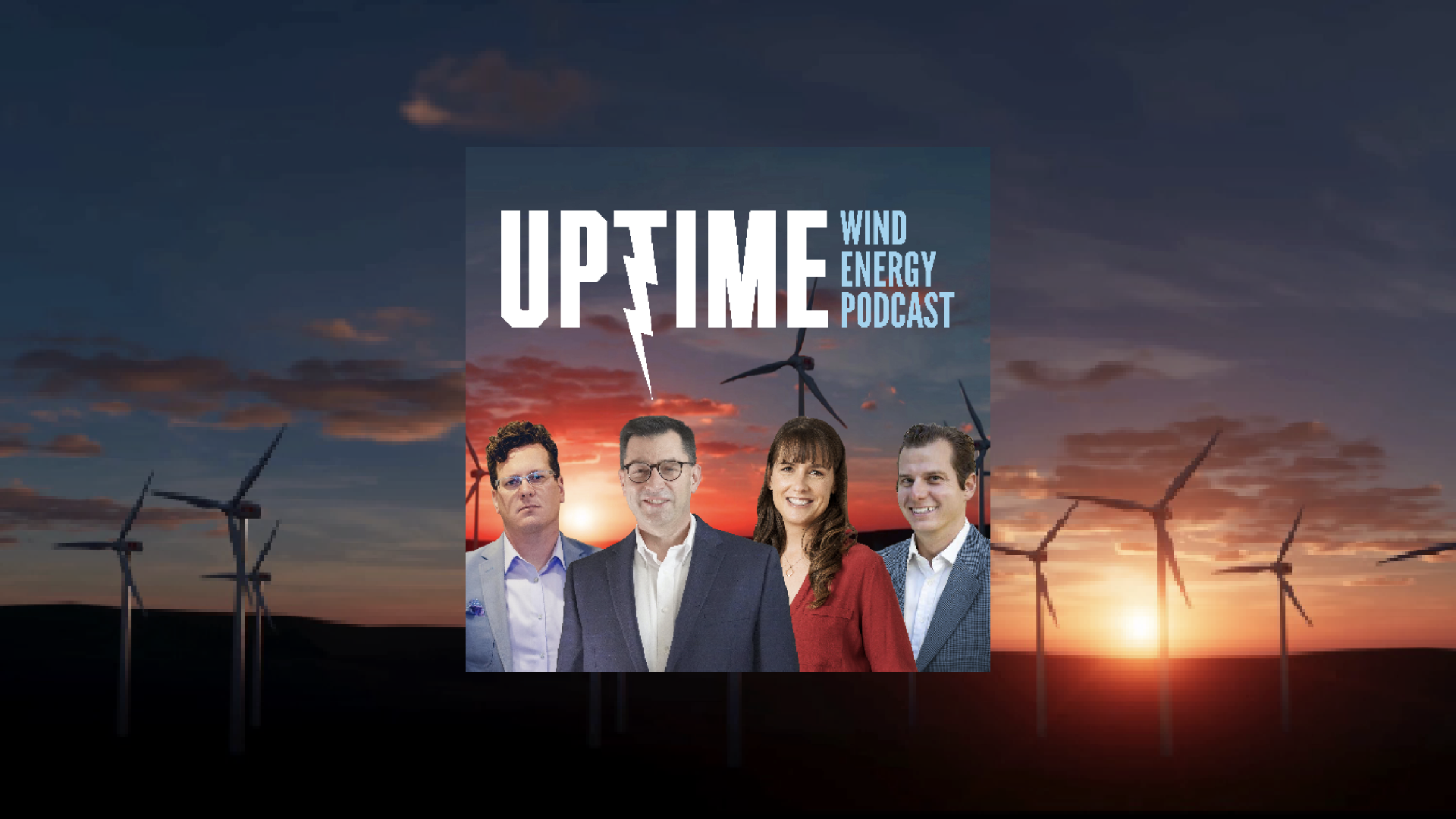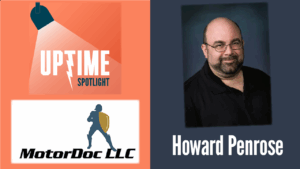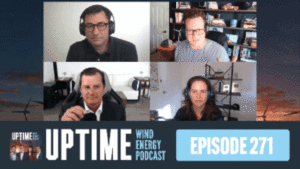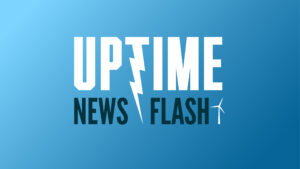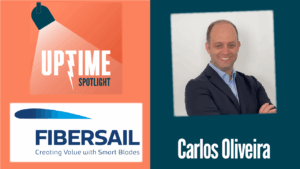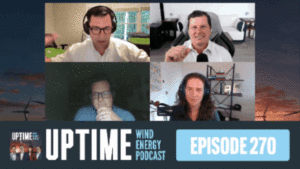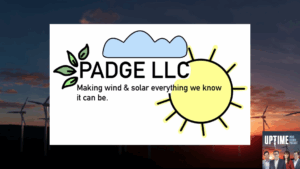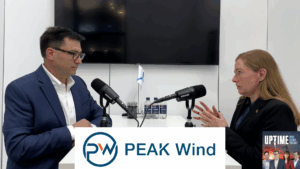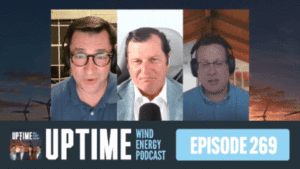Podcast: Play in new window | Download
In this episode, Rosemary and Allen discuss their experiences at WindEurope 2025 in Copenhagen, covering exhibitor highlights, offshore wind projects, industry challenges, and the evolving focus on quality and technology in wind energy. Register for the next SkySpecs Webinar!
Fill out our Uptime listener survey and enter to win an Uptime mug!
Sign up now for Uptime Tech News, our weekly email update on all things wind technology. This episode is sponsored by Weather Guard Lightning Tech. Learn more about Weather Guard’s StrikeTape Wind Turbine LPS retrofit. Follow the show on Facebook, YouTube, Twitter, Linkedin and visit Weather Guard on the web. And subscribe to Rosemary Barnes’ YouTube channel here. Have a question we can answer on the show? Email us!
Allen Hall: Welcome to the Uptime Wind Energy Podcast.
Rosemary Barnes and I are in Copenhagen at Wind Europe 2025 at the Bella Center, which is a full with about 15,000 visitors and 350 exhibitors. This is a massive show. It’s the second largest, I would say, in Europe typically. Right? So Hamburg is bigger, but this is, this is. Still massive.
Rosemary: I haven’t been to Hamburg.
This is the biggest probably conference that I’ve been to. I think probably, ’cause I used to go to, I used to go to a lot of European conferences, but like niche ones, you know, on specific topics like winter wind or, I don’t know, various types of manufacturing. But this is, yeah. All wind and you say 350 exhibitors.
If you had told me three and a half thousand, I, I would’ve believed you because I feel like I have seen so, so few. I mean, I’ve seen so many good exhibits, but not, I haven’t scratched the surface of what’s here. And we’ve only got, I’ve only got one day left. You’re going home, so yeah, your time’s over.
We’ve [00:01:00] just
Allen Hall: walked. Through the hallways quite a bit and the highways to see what is here. It’s a different vibe than what you would see in Australia or see in the United States. It is much more focused on offshore.
Rosemary: Yeah.
Allen Hall: And big scale offshore wind projects.
Rosemary: Yeah. But you know what the Australian NCES are all about offshore wind as well.
It’s like a, a, a weird thing that those of us. Working in the industry, you know, in operations. Can’t quite get our head around how little people talk about the kind of wind energy that we actually have. Um, but here in Europe, obviously they do actually have offshore and a lot of the future development will be in offshore.
So it makes sense here.
Allen Hall: Bristol’s here. R B’s here. Ge Renova. Vestus. Of course, they all have massive displays.
Rosemary: Za not a lot. Nordic
Allen Hall: had some. Yeah. New, new items.
Rosemary: I haven’t seen much, um, Chinese presence here, like
Allen Hall: almost none. Yeah.
Rosemary: Which this time, time surpris me a little bit. [00:02:00] Yeah.
Allen Hall: And there’s not a lot of American presence here either, besides ge Renova as the American, but they’re sort of split, right?
They’re all over the world.
Rosemary: Americans are busy right now. There’s stuff going on at home
Allen Hall: just a little bit. Sure. Uh, but I, uh, I think some perspective there would be good as we get going, because I’m gonna, I’m bringing the American perspective, Rosie, you’re bringing the Australian perspective a lot of.
Uncertainty about the United States at the minute. Uh, much talk of aren’t you super concerned about what’s happening in America? And I said, it’s just another day in America really. And uh, what you read in the papers is not necessarily what’s happening on the ground, uh, but I think other, and Europeans have a different perspective and that’s great.
Speaker 3: Yeah.
Allen Hall: Uh, but it does lead to some weird discussions and maybe Australia, well, you, Australia has a similar problem with America at the moment, but. It, it’s, it’s still, it’s, it feels real. But in the United States, I can just tell you it doesn’t, if you talk to the average citizen, [00:03:00] nothing happened yet. No.
You’re much
Rosemary: more relaxed. Everyone else is, um, is panicking out much, much more. Yeah. Other than cutting the
Allen Hall: vacations and yeah,
Rosemary: I don’t think we’re panicking in Australia. Um, but because we’re probably amongst the least affected outta the rest of the world, but it’s just like, I’m still like refreshing news.
Speeds to see, oh, what else? What else has happened? ’cause you know, the global implications could, is an interesting experiment, is the way someone put it to me recently.
Allen Hall: Yeah. The experiment will probably be short. The issue about, uh, procurement of parts and crossing borders has come up during the show quite a bit.
Yeah. If you’re gonna be selling things in the United States, do we need to be having an office in the United States or do we even think about it because two days later it’s all gonna stop. I’m gonna have spent all that money. Uh, I’m not sure there’s a good answer for that. I gotta ask that quite a bit.
Yeah. Should we, moving to America,
Rosemary: if I was a manufacturer that was worried about, um, yeah. My just [00:04:00] manufacturing facility isn’t in the US and I was worried about tariffs, I would. Find it really hard to say, yeah, let’s make a manufacturing facility in the US because like you said, no one knows is this, how long are these tariffs gonna stick around for?
Yeah, I mean, it’s still at least 50% chance that the real purpose was to bring people to the negotiation table, right? Maybe they’ll be over soon. You can’t really invest in like, you know, like physical manufacturing facilities in that sort of uncertainty. So I, I. Don’t think that it’s going to, in the near term, attract a lot of, uh, yeah.
Outside companies to manufacture in the US if they weren’t before.
Allen Hall: Yeah, I, I agree with you wholly on that. The, the style of show we were here two years ago. We had a wonderful time in Copenhagen, uh, what we noticed two years ago. Was a lot more technology companies. I would say there were more robotics companies, inspection [00:05:00] companies, more on the operations and maintenance side.
There was still obviously the, the shield builders and the, uh, model pile installers and all of that. Uh, but there was much more new technology things happening. Very little of it this time. Hmm. Uh, notice the same thing at American Clean Power O and m or OM and S in Nashville a couple of weeks ago. Uh, much more.
Uh, about keeping the turbines either operating at peak efficiency or on the development side, like we need to get to turbines in the ground now. And this show is, I think, representative of that in the sense that Europeans are more offshore than onshore, but the deployment, deployment, deployment, we’re just trying to rapidly Europe’s, trying to rapidly deploy gigawatts out in the ocean.
Which is one of the most complicated ways to build a turbine, but Europe has the, the capability to do it. Look, walking around this show, it’s, it’s evident like the [00:06:00] process is in place, the tools are in place, that people are in place to make offshore wind extremely successful.
Rosemary: Yeah, it’s really interesting, the contrast between Europe, it was just.
Doing it versus the US who seem convinced that it’s impossible to do offshore wind. It’s like, well, hello. Like, look across the, at the ocean and you can see that it’s possible and can be cost effective in the right, um, circumstances. So, yeah. Uh, interesting contrast. Mm-hmm.
Allen Hall: And, uh, just, uh, walking around some of the things that I noticed were on, on the building and the deployment, uh, tools to make it faster, shorter times to assemble some of these turbines to, to get more gigawatts in with less cost.
That is a huge emphasis too, so that the tools are better, the technology’s better, the quality systems are better, the reporting is better. All the pieces that were just kind of left. On the sidelines for a while are now coming back into focus and you see an emphasis on the quality of the turbines. It’s one of the discussion points on the floor was, [00:07:00] Hey, let’s, let’s get the turbine development cycle down.
We’re not building so many new turbines, but we’re making the ones we have much more efficient and much more reliable.
Rosemary: Yeah, no, I think that’s a. Correction that needed to happen. It was the technology. I love technology development. It’s my thing, right? But it was happening too fast to, you know, rushing, rushing through new technologies and you know, making them bigger and bigger before the previous one had been fully understood.
And so you kind of like get ahead of yourself. And we have got lots of, uh, quality problems, warranty costs blowing out. So it makes sense that you would see less emphasis on new technology and more emphasis on, you know, incrementally and, um, just categorically removing quality problems and risks from the existing.
Uh, yeah. That what we’ve already got.
Allen Hall: Yeah. And the weather in Copenhagen has been,
Rosemary: it’s ridiculous. It’s so dated. It makes me hear like, why did I, why did I ever struggle to with the weather when I lived here? It’s, uh, [00:08:00] it’s insane. Yeah.
Allen Hall: I don’t know what it is in south. Here, it’s about 50 degrees Fahrenheit.
Rosemary: Yeah. It’s been, uh, 10 degrees, no, like thir 13, 15 degree maximums. Um, just beautiful, clear skies. Haven’t seen a drop of rain. No
Allen Hall: rain. Yeah. Crazy.
Rosemary: Yeah, it’s, it’s been lovely.
Allen Hall: It’s been great. And one of the things I thought I would see more of here, because it’s a little cooler here than it is in the states at the moment, is, uh, many, many more companies looking at deicing systems because that seems to be where a lot of power is lost.
And when you go to a show in Phoenix, like American Clean Power, no one’s talking about de-icing there. ’cause it’s 105 degrees Fahrenheit there, right? But when you come to Denmark, I always think, well, it’s cold. You’re offshore, there is ice. You see more I de-icing technology. Did you see any really here?
Rosemary: No, not deicing technology specifically, but there is one company, uh, um, a woman I used to climb turbines with. She now works for this Swedish company that is doing ice forecasting. That’s very interesting. And we’ll have to record an [00:09:00] episode with those guys later on ’cause that, yeah. Um, that was, you know, when I was, I was working every day on icing for five years and, uh, that.
It’s one of the things that would always, the technology to actually make, you know, get enough energy to get the heat, enough heat everywhere that you need. It is immense. And if you can just stop the ice building up by being smart about, uh, yeah. Like if you know that you’re about to ice up a bunch, just stop the turbine for an hour or two while those conditions are there and then start up again.
You’ll see if you have a world of travel and it’s a much easier problem, I think to see. And solve the problem of actually removing it once it’s there. So I’d be very interested to find out more about how they’re doing that
Allen Hall: and sticking to that technology bent for a second. Very little in ai.
Rosemary: Yeah.
Allen Hall: Isn’t that strange?
Rosemary: Yeah, that’s true. That didn’t occur to me ’cause, but. Uh, I mean, I hear a little bit about AI in terms of we need more power in order to, you know, [00:10:00] build more data centers and stuff like that. So I think people are aware of it for that reason. Um, yeah, I haven’t seen, I haven’t seen too much. I mean, it’s probably there beneath the surface and a lot of technologies, but you don’t hear it pushed as a selling point as much here as.
It seems like, yeah, I don’t know. Elsewhere, everyone wants to attach all the time, the name AI to anything they’re doing.
Allen Hall: Right. Do ai, you see that quite a bit? Yeah. More recently. And then the, the, the spending by the, the companies and where they’re putting the resources and marketing has changed, I think, quite a bit over the last several months.
And obviously some of the more recent economic activities have made decisions for a lot of people, but. Companies that have cash, I would assume have cash or are big enough to, to have decent sized displays and booze at, um, yeah. When Europe don’t, don’t have them, which is, I thought was a little strange because some of the bigger [00:11:00] players that I would assume would have at least have a booth.
Do not have boost. Like they decided just to walk the floor. And we, we did the same thing actually this year, is that, uh, we didn’t see a lot of sales happening. Europe’s really focused on offshore’s, a lot of development happening. It’s not as much focused on the o and m side at these shows. It’s on the deployment side.
So they decided to hold their cash, which is unusual because you would like to see a little bit of everything. I would,
Rosemary: yeah. I mean, I’ve seen some big ones and like I said, I haven’t been to a lot of these really big ones before. Chuck Dway in Australia, and um, they haven’t been over so much, but I’ve been, I’ve been to a few that seemed big to me.
Like Vestas had a two story. Thing there. I went and talked to an old colleague of mine from LM days, so he’s working on some cool things and we yeah, discussed the state of, uh, you are like, what? Like most of our old colleagues I mentioned that I had been to the LM when Power Booth and knocked around. I didn’t see a single [00:12:00] person that I, I knew, which made me really sad because I worked there for nearly five years and um, yeah, there are, apparently there are a few people, I’ve seen quite a few LM XLM people, um, in different.
Companies. So it’s nice to see a lot of people still working in the industry. Um, but yeah, it’s, uh, there’s not as much engineering happening in Denmark anymore as there used to be. Yes. For the wind industry. Like it’s really
Allen Hall: noticeable.
Rosemary: Really? Yeah. It’s really noticeable. Small, not every company, but so like, it felt like Vest still had a lot of cool engineering happening.
They do in Denmark, but are they next? You know, like it makes me a little bit, are they the next to just like, you know, close every facility and fire 90% of the engineers? I mean, I don’t, I don’t understand how it’s possible that when you’re in your biggest quality warranty. Period. Like how do you expect to get through that and get out the other side if you fire the engineers that know why decisions were made And you know, like every time that you try to come up with a new [00:13:00] solution, if you don’t have the knowledge of what you tried before, you have to repeat a lot of mistakes.
And it’s, um, it’s very hard to document that in a way that the next generation will be able to. To, yes. Uh, maybe it’s a job for AI because, I mean, you do have to write a report. Um, usually in a big company, if you’ve got a project that failed, um, or even one that’s succeeded, you write lessons learned.
Maybe they’re feeding that into AI and that’s why they don’t need to keep any, any institutional knowledge anymore because it’s just all a robot. And
Allen Hall: I don’t think that’s it. But, um, I, I do think that’s something that’s happened in over the last six months that I’ve noticed that specifically. Uh, in the lightning area, but in other areas too.
It’s not just lightning that there’s a lot of younger, newer, uh, engineers that are coming into wind that are trying to make a difference, and they don’t know the lessons of the generation before. Hmm. And you we’re at this odd inflection point, I think, because there’s a lot [00:14:00] of, of the people that were developing wind in the eighties and nineties that are starting to retire out now.
Speaker 3: Hmm.
Allen Hall: And you’re losing all that knowledge and you see some of them on the floor here and they’re icons. Right. When you
Rosemary: speaking icons, I, um, I met Henrik Dale at the Australian Ambassador’s re uh, residence. I got a. Managed to score myself a last minute invite. Amazing, uh, amazing apartment overlooking the Yeah.
The harbor wind turbines. In the background, you can see, you know, their, um, CHP, the power plant that, uh, has a ski hill and rock rock climbing wall on it. All laid out there and I, yeah. Uh, ’cause I, I don’t think there were many engineers at that event, so I, as soon as I realized he was there, I, you know, basically ran over to try and, uh, chat with him, assuming that,
Speaker 3: did anybody else know
Rosemary: everybody would wanna talk to him, but, um, yeah, I mean, people knew who he was.
Sure he was there because he was interviewed in the Australian producer. Film on offshore wind energy around the world. [00:15:00] Nice. So, I mean, it, it’s not like he was unknown, but I, um, was able to chat with him for a while and it was interesting to talk about, you know, how things were when he was working on, you know, just normal wind turbines.
He’s still working on some related things. Sure. Um, and even to, yeah, like update on some of the today’s problems. Uh, you know, we had a discussion about lightning protection and is, uh, was, you know, surprised to hear how bad the situation has gotten because it’s really weird to think, you know, like by the time, so I think he said 15 years ago, he was still working at, um, Siemens Za, right?
And, uh, it’s like, yeah, but there weren’t problems with lightning. Like how have you gone backwards? I was like, well, it’s not. It’s not that it’s gone backwards, it’s that the blade technology’s progressed and what used to work perfectly adequately.
Allen Hall: Yeah.
Rosemary: No longer does. And so, yeah, it is interesting like from that perspective to think of things that are worse now than they were 10, 20 years ago.
But I would say, you know mean there are quite a few lightning leading, edge erosion. Yes. Um, yeah. [00:16:00] Even, uh, you know, like some structural during composite composite, um, yeah, the composite structures, it’s just a lot harder when they’re. Big and really thick and you know, like I said, the game’s totally changed.
And so I guess it’s a good reminder that technology or quality, everything doesn’t always go in one direction, right? No. You know, there’s lots of things happening at once and you can, you can go backwards.
Allen Hall: Yeah. And I, I do see a lot of young people here, which is great because I think it’s, it’s. The perfect level of exposure to understand what the industry looks like.
I know a lot of companies don’t send their engineers to some of these events, and I, I think they’re missing out on one of the quickest learning cycles you can get is to see what others are doing. Go to go see what Vest is up to, to see what Nordex is doing, to see what Intercon is up. To, to go see what GE Renova is proposing at the moment and then to look at all the sub-tier suppliers that go that feed those and what they’re working on and where are they going and what’s so that.
[00:17:00] That I think is a missed opportunity by a lot of of companies because I do think there’s a lot of problems at the minute. And the emphasis in this show is quality, quality, quality. Let’s get the quality better, quicker, faster. Let’s stop building as rapidly. This is keep the rotor diameters roughly the same.
And Vest has had some big scores recently on 15 megawatt turbines, which is great. That’s where we need to be. Do you think that, oh, that this trend continues, that we Well, where do you see the industry going? You, you, you’ve. Come from Australia, you’re sort of independent of the European scene and you’ve walked into it.
Where do you think the European wind industry is at the moment? Yeah,
Rosemary: I mean, it’s gotta be offshore. I mean, there’s, yeah, Europe is crowded. That’s the main thing that you, uh, I mean, definitely as an Australian you see that when you move to Europe. Like I spent every weekend trying to find a place where there weren’t a lot of other people.
And it, it’s hard. Um, and you know from the US as well, you’ve got a lot of wide open space in, in the us Yeah. So. That’s the big difference in Europe is, um, even though people are very happy, for the most [00:18:00] part to live quite close to wind turbines, you can’t put them absolutely everywhere. You don’t want them in your literal backyard.
Like it’s fine to see it, but you know, it doesn’t mean you want to, you know, live, live inside a wind turbine. Um, and offshore. Offshore is the only way to go. Um, I do say. Progress on floating, but I think people are, yeah,
Allen Hall: not much on floating.
Rosemary: Yeah. The, uh, a lot of conversations I’ve had about floating, people are just saying it’s just moving a bit slower than we expected.
I mean, I always expected it to move slowly, so I don’t feel that particularly surprised about it, but I still feel quite hopeful about floating offshore wind that. That there are niches. You know, like if you look at a country like Japan for example, it’s like they’re not choosing between having, you know, just half of the electricity made from solar power and then factories at night, and that’s all fine.
They’re choosing between. Importing, continuing to import fossil fuels for, you know, today’s level. And then if they do stick to their net zero [00:19:00] commitments, then they’re talking about importing ammonia or importing liquid hydrogen. So you’re comparing floating offshore wind to. Other really crazy, expensive, immature technologies.
So I think it’s a lot more likely there. I think that there are some really big niches in SHO floating offshore wind where it can get a foothold and eventually the long term potential is there to use less steel than a fixed bottom. So. I still think that, you know, like thinking a decade, two decades ahead, that there’s a strong chance that it floating our shop.
Do
Allen Hall: you just think, right, you think right now that floating is still seemed as risky? You think it’s an investment side issue or a technology issue?
Rosemary: Um, uh, I think it’s a way to go in technology, but yeah, it’s expensive. That’s, I think the main problem now is, is that it’s expensive. I think Europe has been pretty happy in the.
Past to pay more for expensive things, or at least plan to pay more, you know, look at their extensive [00:20:00] hydrogen plans. They’re not phased by the just immense costs that that would, that, that would have. Um, I think now, and partly because of, you know, the shake up that America has caused, I think people are starting to feel a little bit less willing to spend more.
And I think that we’re gonna see. The technologies that are gonna move fast are the ones that are already saving people money. And so that means, you know, a lot of, a lot of wind energy. Um, also solar and batteries and electric cars, they should all, you know, continue because they’re kind of at that level where it’s starting to, you know, make more and more sense on its own.
And floating offshore I think is just going to take a little bit longer. I don’t think you’re gonna see a whole lot of projects in Europe where they don’t. Need it. Need it, you know, I think it’s gonna be up to the places where they don’t have other choices to do it. First. I, if I, if I owned a floating or sher wind company, that’s what I would be expecting my first markets to be.
Allen Hall: Okay. That’s fair. I wouldn’t,
Rosemary: wouldn’t be looking for, you know, a million dollar grant from the eu. [00:21:00] I, I’m not sure that there’s gonna be, be those in a few years because, uh, you know, they’ve got other things to spend their money on.
Allen Hall: Now let’s just talk about the conference for a little bit and what you thought of the conference and.
How it was run and the, you know, when Europe typically, in my opinion, is one of the better run, more organized conferences that I will attend. Mm-hmm. Uh, I, I always think they really try to take care of the people that are attending it from, I’m gonna think about food first. I don’t know why I say that, but.
Rosemary: I was just gonna say lunch is, lunch is good.
Allen Hall: Lunch is great. Good. Yeah. It’s insanely nice. Uh, your real China with metal. Silverware. And,
Rosemary: and salads. Salads, yes. Yeah. You can eat some vegetables. That’s what I hate when I travel. Some, some places you travel to. It’s impossible to eat a vegetable. And you need to eat vegetables to feel good.
You know, you can
Allen Hall: have a lot of vegetables. You can when you’re up. Yeah. Every year. Yes. Uh, and the desserts are quite lovely. Yeah. They have tried to have a, a little bit of a more European [00:22:00] flare to the, to the meals are not all con completely danish, I think. Do you think
Rosemary: they had mini smurf roll yesterday?
So I was happy about that. ’cause I, that’s one of the things I, I miss, I would’ve preferred more Danish, but that’s because. You know, I lived here and there’s certain things that I miss and I’m only in town for four days, so it is like hard to work the way through. I’ve ticked off most of them had, uh, yeah, a couple of the key Danish pastries.
Um, yeah, the al I had some Danish potatoes. Not enough. Yeah. Look, love Danish potatoes. Yeah. So,
Allen Hall: but even get, getting down to the app and the ability to, to have a map, like a paper map at times where it’s just sometimes you must have paper to figure this out. Yeah, that super helpful. We’ll
Rosemary: give you direction somewhere.
You just tell like, I’m standing at the envision stall and I need to get to whatever particular coffee zone that someone has said to me. You are, and I’m all turned around ’cause in the wrong hemisphere. And my sense of direction, just it’s, it’s not that I get it back to [00:23:00] front, it just disappears. I’m just like, I don’t, don’t even ask me like which direction I walked in from.
Like, I don’t remember anymore. It’s so bad. So, yeah, I appreciate that. The app is pretty good.
Allen Hall: Yeah. Which makes it more enjoyable. And they have, going back to the food again, the little snack carts and uh, food trucks and, uh, little but you have to pay
Rosemary: for though, right? Some
Allen Hall: of the food trucks. But they, I, they evidently had an ice cream.
Rosemary: Yeah, I did free ice cream yesterday. It was really good. Actually. It was strawberry and it was like, I love strawberry. It was excellent. Yeah. Oh,
Allen Hall: okay.
Rosemary: Yeah. You missed out. Um, one criticism, tea bag selection. Just a bunch of down
Allen Hall: this year.
Rosemary: Yeah. There’s only like different kinds of black tea. You need some, like tea you need or you know, like some sort of relaxer.
’cause it’s just so like, you’re so just on, you can’t just drink coffee all day or you just get too, too wound up, you know?
Allen Hall: I don’t know if you watch the Danish
Rosemary: decaf drink coffee without decaf, something, without caffeine in it to relax in between [00:24:00] meetings. And
Allen Hall: as an American, I always think it’s interesting when you go to a show in Europe and they have those $30,000, uh, grinder.
Coffee makers everywhere.
Speaker 3: Like
Allen Hall: in America, you would get a pot full of liquid coffee that’s been brewing since yesterday. But here you have the little touchscreen and it grinds it and it makes a fresh cup right in front of you.
Rosemary: Here I’m gonna display our cultural differences because I would’ve definitely put the coffee as a negative in that place.
I mean, I’m not, I know I’m not in Australia and I can’t expect it, but yeah, there’s one, there’s a good cafe near where I’m staying, so I’ve had my coffee there every day. Yeah. And then I, um, stick to tea for the rest of the day because it’s. Uh, the coffee is, it’s terrible. I’ve always hated Danish coffee.
They’re like famous, famous. They’re famous for a good copy and I, I,
Allen Hall: oh, I quite enjoy it. I don’t
Rosemary: like it. Yeah. Sorry. Sorry. Everyone knows Australians are coffee snobs. Deny it. This is true. Absolutely. Well,
Allen Hall: the coffee in Australia is amazing. Yeah. I, I can’t deny that, but I don’t think Europe’s that. Far off.
Rosemary: Yeah, I do. [00:25:00] Yeah.
Allen Hall: America definitely is. Yeah. Yeah. Okay. Yeah, we did, we did happen to stop into Starbucks and because everything else was closed, then we had a Starbucks and Yeah. It tastes like burnt coffee. Yeah. But that’s what they offer. So that’s what you do.
Rosemary: Yeah. That it’s not a big complaint. I, yeah. Uh, what about the, um, actual.
Conference. Have you been to any sessions? I have not
Allen Hall: seen any technical sessions. I never do.
Rosemary: Did you go to any, any sessions, commercial ones or?
Allen Hall: No, I never go.
Rosemary: Yeah.
Allen Hall: And I feel like there’s just other things I need to be doing while I’m here and I don’t get to Europe all that often. But when I do get here, I want to meet the people that I know that I only see in Zoom for 11 months out of the year when when I get to see them in person.
All the other stuff goes by the wayside. Mm-hmm. Uh, it’s just nice to meet everybody.
Rosemary: Yeah. I mean, that’s what I’ve done most of as well. Um, but in my ideal scenario, I would’ve been going to much more sessions. [00:26:00] Like I didn’t, looking at the program, I wasn’t like really excited about. A lot of it. There were, there were, there was enough.
Um, but I’ve been to one, one session on innovation and I didn’t get all the way through, but there was, um, a presentation on leading edge erosion.
Allen Hall: Was it good?
Rosemary: Uh, they described the problem very well, but I was lucky in solutions and Okay. Yeah, I mean, I always want to, it’s been Europe, so it’s European focus, obviously, but I always want to be like, well, you know, how does this apply to Australia?
I would really love to, actually, I’ll probably follow up with it ’cause I, um, okay. The presenter, because I would like to add an Australian perspective to that sort of conversation.
Allen Hall: I always think at conferences, if you’re not presenting solutions and you’re not presenting the right information.
Rosemary: Yeah, I don’t know.
My background is, you know, like I did a PhD, so I went to lots of Yeah,
Allen Hall: sure.
Rosemary: Academic conferences. So, uh, I’m kind of quite used to people talking a lot about problems, um, and not necessarily having a, a solution. But there [00:27:00] was some other ones, uh, there was one on, um, lightning, um. Like testing of lightning protection.
Uh, yeah, sure. Which again, like they were really describing the problem, but it’s a problem that I have talked about before, but I hadn’t seen anybody else kind of recognize it’s a problem, has to do with the, you know, fatigue of the, of the LPS systems. Um. And then what else? Were there concrete towers? Um, oh, I didn’t, yeah,
Allen Hall: probably should attended that one.
Alright. Yeah,
Rosemary: I mean it wasn’t like, there wasn’t a lot of like real meaty stuff in there, but it was enough to get you thinking and I mean, it was definitely a worthwhile session. I feel like there was one more session that I. Can’t recall now, but, um, yeah. But that’s
Allen Hall: us. I, I know European conferences tend to be more technically focused than America.
America, when you, you hear Europeans come over, it’s all about the sale that everybody’s trying to sell you everything. Yeah. Which is true. You can’t deny it. Yeah. But it didn’t
Rosemary: feel like a sales pitch. Yeah. Though, [00:28:00] I mean, I’m sure that’s why they are. Fair. But one thing that I did notice, like a thread through those, um, couple of presentations that I saw was people are starting to think of like combinations of, of, uh, of effects.
So, you know, with leading edge erosion, instead of just talking about, um, you know, like tip speed, it’s like okay, but also dust is an issue and also. So UV is an issue and also temperature is an issue and we need to look at the combinations. Drop size of those things. Yeah. Droplet size. Um, I still think we’re a long way away from testing and simulation, being able to actually have real world applications, but at least people are asking the right questions now.
Um, and then the same with Lightning, you know, it was like, um. You know, fatigue. Yeah. The, the mechanical properties, uh, mechanical behavior of it and how over time that might change the effectiveness of the lining protection system. Sure. And, you know, yeah. There was a question asked about, uh, in the testing that they did, did they.
Um, was the [00:29:00] amount of fatigue cycles, was that the same as what’s required under certification? Um, ’cause they showed some, some failure. You know, you do, um, fatigue testing and then, you know, you get tiny, tiny cracks in there, micro cracking, and then you do your electrical test and, you know, um, it got really hot.
Allen Hall: Yeah.
Rosemary: Um, and so someone was asking, you know, is this beyond the lifetime that it has to be certified for? And it’s like. No, they don’t. They don’t, they don’t do that. They don’t do that at all. You test a, you test a blade in fatigue to make sure that the blade structure is sufficient, not the tip, because that’s not relevant to fatigue behavior of a blade in terms of the structure.
Um, and then they test a brand new blade, not the one that was fatigue tested. They test a brand new blade for lightning. So it is just something that isn’t. Isn’t tested. And I’ve definitely heard people in the industry say, you don’t need to. And I’m like, it’s such a high strain environment, you know, the very tip of a wind turbine blade.
The strain there is incredible, incredible metals, you know, are subject to, um, fatigue failures. So it makes a lot of sense to me. And so it’s [00:30:00] good to see. Now that was, that was a presentation by Polytech, by the way. So it’s good to see the right questions being asked. Sure. Solutions not presented yet, but you know, right.
Yeah. Asking the right question is a right question. A, a good step.
Allen Hall: That’s true. Uh, also our announcement this week, uh, that we’ve reached 1 million subscribers on YouTube for the Uptime Wind Energy Podcast. Now we were looking for some alcohol and we really couldn’t find it, so we’ll have to, we’ll
Rosemary: have to do a toast later on.
I can’t even believe it like it is actually.
People are, people are watching, people are subscribing and yeah,
Allen Hall: well when is the future?
Well, it’s also the now, but it will be even more in the future. The energy of choice,
Rosemary Barnes: I think. Um, ’cause you know, for a long time I was too busy to watch many episodes and especially ’cause I already heard. You heard it and you were there as I was reporting it, so I didn’t, you know, listen to as much back, but I have a lot recently, there’s a lot more episodes without me in it.
And, um, as I’m, I’m working a lot more in operations, uh, and maintenance now than I was in the past. And so a lot of times I need to find out about a new topic and I will. Level search the back catalog. And, um, there’s always something, I mean, if you’re looking at a specific company, they’ve probably been interviewed.
But more than that, like on a topic, you’ll see several [00:01:00] different people, um, different companies, different perspectives, and you can learn a lot. Very easy. We should organize, by the way, we should get the YouTube channel organized into playlist to make that
Allen Hall: We are working on that now. Yeah. Right? Yes. Right.
Yes.
Rosemary Barnes: Claire’s probably doing it. She is. Yeah. Yes.
Allen Hall: But you can also use ai. Yeah. Just to search our database and find the episode you’re looking for. Yeah. Which, what a lot of people do. Yeah.
Rosemary Barnes: That then that’s what I, that’s what I’ve been doing. But, um, so I can definitely see the, see the value now that I’m using it myself, as well as being, you know, a part of it, but also using it as a resource.
And I can see why it’s so, so popular, because it’s all, it’s all there.
Allen Hall: It’s the fastest tool to get to an answer or really close to an answer, or maybe to know who to reach out to.
Rosemary Barnes: Yeah, and also to just know the, you know, when you’re new to a topic and you don’t really know the right words to use in your, make the
Allen Hall: phraseology language.
Yeah. Get hesitant to
Rosemary Barnes: even talk to, you know, your, your. Your boss or the other guy at the office because you’re a bit embarrassed, it’s a really good way to get up to speed and quickly, you know, [00:02:00] like you know all the obvious things and Yeah, like quickly, you’re not gonna feel embarrassed that you’ll know.
If your question is, if it’s obvious, it’s probably been answered on the podcast, and if it hasn’t been, then you probably know that, okay, this is a. A legitimate question, and I don’t need to feel embarrassed to ask. Not that you should ever feel embarrassed to ask questions. No.
Allen Hall: We get questions. We get questions all the time where people, uh, asking to have certain guests on because they’re trying to get to that answer, and they just don’t always connect.
And a lot of the technology is in Europe or in Australia or in Asia. And it, it’s hard to reach out to those people. Uh, but we can usually get inside the doorway. Uh, so congratulations, Rosemary also to Phil and to Joel. Yeah. Nice job. And to producer Claire.
Rosemary Barnes: It’s all, it’s all because of Claire,
Allen Hall: evidently.
Yes. That’s the
Rosemary Barnes: real MVP,
Allen Hall: that’s what everybody’s told me today.
Rosemary Barnes: Yeah.
Allen Hall: So, oh, that’s quite nice.
Rosemary Barnes: You raised her, so, oh, did I? You know, you can take the ultimate credit.
Allen Hall: She’ll deny that, but [00:03:00] yeah, I. Really have enjoyed spending, uh, the last couple of days with you at the conference. It’s been a lot of fun and, and good to see Nicholas Godder, Matthew Stid.
I don’t wanna leave out a bunch of people, but, uh, it’s just nice to see everybody and connect up once again.
Rosemary Barnes: Yeah,
Allen Hall: so it’s been a fun time and we’ll have to do it. Um, which the next time we’re gonna be together.
Rosemary Barnes: Maybe Houston. Maybe
Allen Hall: Houston in October.
Rosemary Barnes: Yeah, I think that’s right.
Allen Hall: Okay. Yeah, so stay tuned for that.
That’s gonna be more information released shortly. Uh, but yeah, you may see us all together in October, which will be nice. Yeah, so job well done. Well thanks Rosemary. Thanks for spending the week with us and uh,
Rosemary Barnes: thank you.
Allen Hall: Safe travels. Thank
Rosemary Barnes: you everybody for subscribing to the YouTube channel and making us, uh, yell legitimate.
Legitimate YouTube. We’ve got press passes for the We did conference, so Yeah, that’s, you know, like we’ve made it,
Allen Hall: we’ll let anybody in.
Rosemary Barnes: Yeah. Well, we peeked into the, uh, press room, which we are entitled access to, but there’s lots of like serious, proper journalists are tapping away on, on computers and they’re on TikTok.
Don’t [00:04:00] worry about it.
Allen Hall: Not for us.



